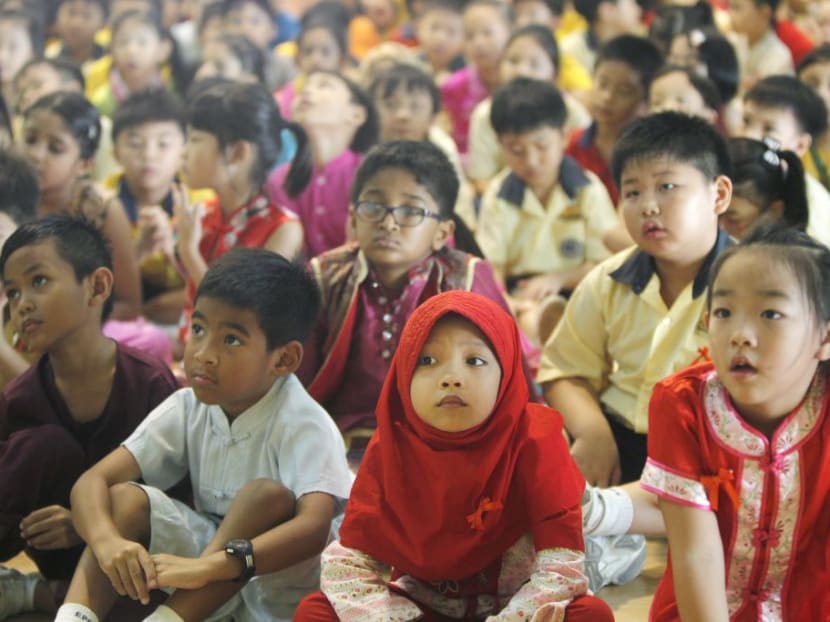Apathy of ‘culturally closed off’ Singaporeans could affect social cohesion: IPS researcher
SINGAPORE — There are a number of Singaporeans who do not interact with other races, close themselves off to global influences, and are against inter-racial dating, an Institute of Policy Studies (IPS) researcher found, noting that this group of people are mainly Chinese, better-educated and live in private housing.

Communications and Information Minister S Iswaran reiterated the need for greater social interactions between different ethnic and cultural groups.
SINGAPORE — There are a number of Singaporeans who do not interact with other races, close themselves off to global influences, and are against inter-racial dating, an Institute of Policy Studies (IPS) researcher found, noting that this group of people are mainly Chinese and better-educated, speak English more, and live in private housing.
Their apathy will hinder cohesion in Singapore's multiracial society in the long run, IPS senior research fellow Mathew Mathews said on Thursday (July 19), when he released his findings at a forum organised by IPS and OnePeople.sg, the national body that promotes racial harmony.
This group of Singaporeans mentioned by Dr Mathews was among several he studied, derived from a Channel NewsAsia-IPS survey published last year involving 2,000 survey respondents.
He had categorised the respondents based on five main variables: Consumption of non-Singaporean culture, ethnic pride and performance, inter-ethnic literacy (how familiar they are with other races’ important ethnic and religious beliefs and customs), participation in festivals and activities of other races, and their acceptance of inter-ethnic dating.
They were then grouped into four clusters: The “culturally closed off”, the “cosmopolitan chameleon”, the “informed ethnic insulars”, the “platonic multiculturalists”.
The first group of respondents display traits such as being less open to global influences and culture, not practising their own ethnic festivals and customs as often, and not participating in the customs of other races.
They are also not comfortable with inter-racial dating for their children or grandchildren, and may be less motivated to be “culturally literate or engaged”.
The second group comprises people who do not have a strong ethnic orientation, and are comfortable with their children dating inter-racially. However, they are “not very aware of cultural nuances”.
Dr Mathews said: “Though open to other cultures, they may need help to become culturally literate, if not they might unintentionally offend others.”
Made up of mostly people from the minority races, they speak English more, and are less likely to live in a three-, four-, or five-room Housing and Development Board (HDB) flat.
For the third group, they are more strongly orientated to their ethnic culture. However, they are aware of the other races’ important ethnic and religious beliefs and customs of other races. These people tend to be older, less educated, speak in their mother tongue more often and are less likely to live in private housing.
Getting this group to fully embrace multiculturalism may be an uphill task, but “at least they are not ignorant of differences”, Dr Mathews said. “Based on their passion for transmitting ethnic culture, this group will help sustain and transmit ethnic identity,” he added.
On the other end of the spectrum from the “culturally closed off”, the “platonic multiculturalists” represent the product of Singapore’s multicultural policies, and they are “taught to be open to global cultures, yet share and feel a sense of ethnic consciousness”, he said.
They are both highly aware of different cultural practices and engage in them. Nevertheless, they are not entirely comfortable with inter-racial dating. They are less likely to be Chinese, are more educated and speak in their mother tongue more.
At the forum, Communications and Information Minister S. Iswaran reiterated the need for greater social interactions between different ethnic and cultural groups, so that people can “naturally forge strong bonds regardless of the usual barriers of race, language, or religion”.
“We must ensure that Singaporeans are immersed in a diverse everyday environment, and remain curious about each other’s cultures,” he said. “While cross-cultural engagement is essential… we must also be prepared to take a stand against behaviour that is disrespectful to other cultures.”
Warning of the danger of divisive, inflammatory rhetoric which can quickly spread and cause damage, Mr Iswaran also noted that Singapore’s policies to promote communication, understanding and social interaction between different races and religions remain as “relevant and important as ever”.
On the individual level, everyone must be able “to cultivate a sense of belonging that transcends their ethnic identity, and develop a deep and genuine interest in Singaporeans of other ethnicities”, he said.









